Catholic Social Thought: Examining Principles, Community, and Self
VerifiedAdded on 2023/06/10
|5
|1340
|187
Essay
AI Summary
This essay delves into the principles of Catholic Social Thought, focusing on their relevance to society and human dignity. It outlines key principles derived from papal and conciliar documents, including the common good, human dignity, human rights, the preferential option for the poor, stewardship, and subsidiarity. The essay then explores the interrelationship between the concepts of the self and the community, arguing that the principles of Catholic Social Thought provide a framework for understanding the connection between individual identity and social structures. The essay concludes that there is a strong interrelation between the self and the community, as the principles of Catholic Social Thought are essential in establishing this interrelationship. The essay references several academic sources to support its claims, providing a comprehensive overview of the topic.
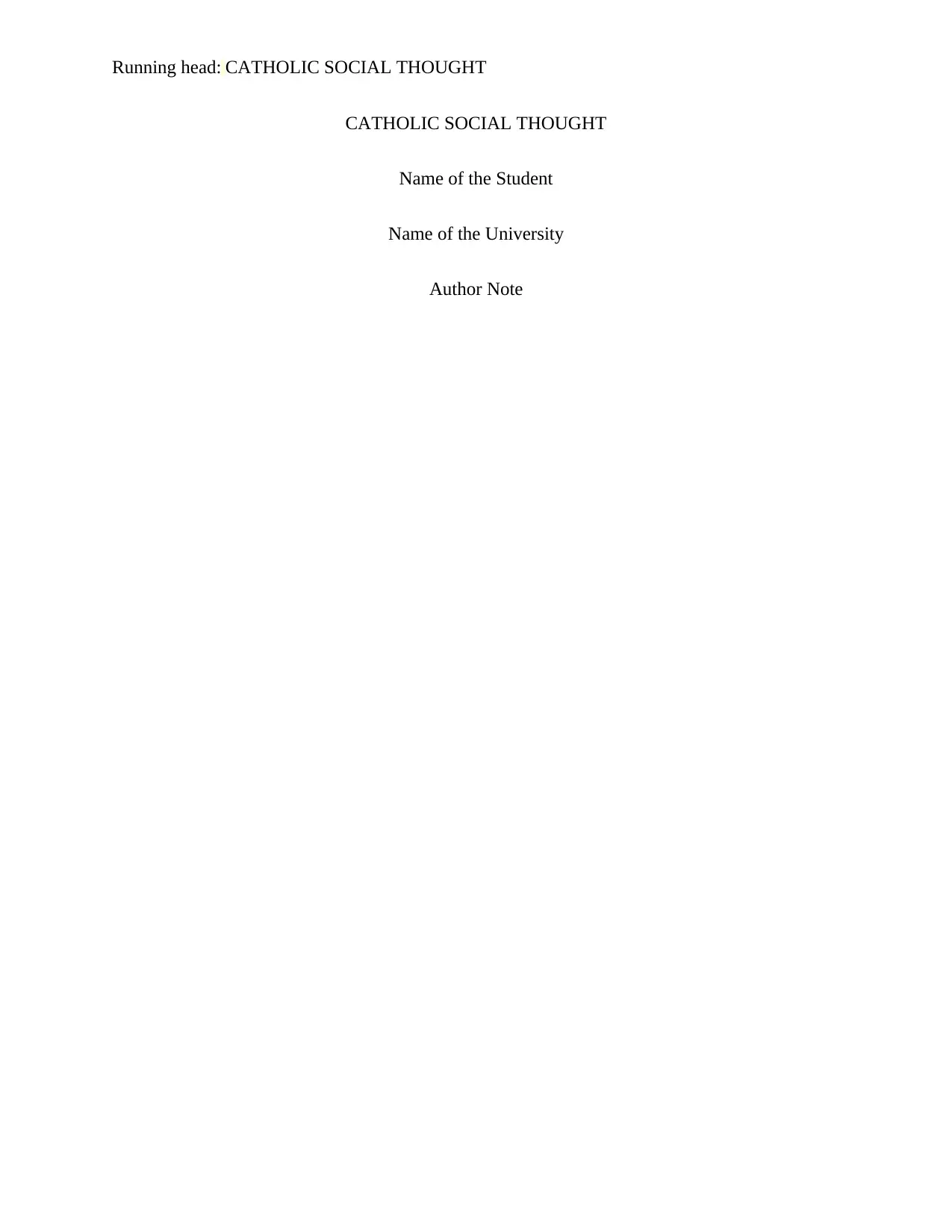
Running head: CATHOLIC SOCIAL THOUGHT
CATHOLIC SOCIAL THOUGHT
Name of the Student
Name of the University
Author Note
CATHOLIC SOCIAL THOUGHT
Name of the Student
Name of the University
Author Note
Paraphrase This Document
Need a fresh take? Get an instant paraphrase of this document with our AI Paraphraser
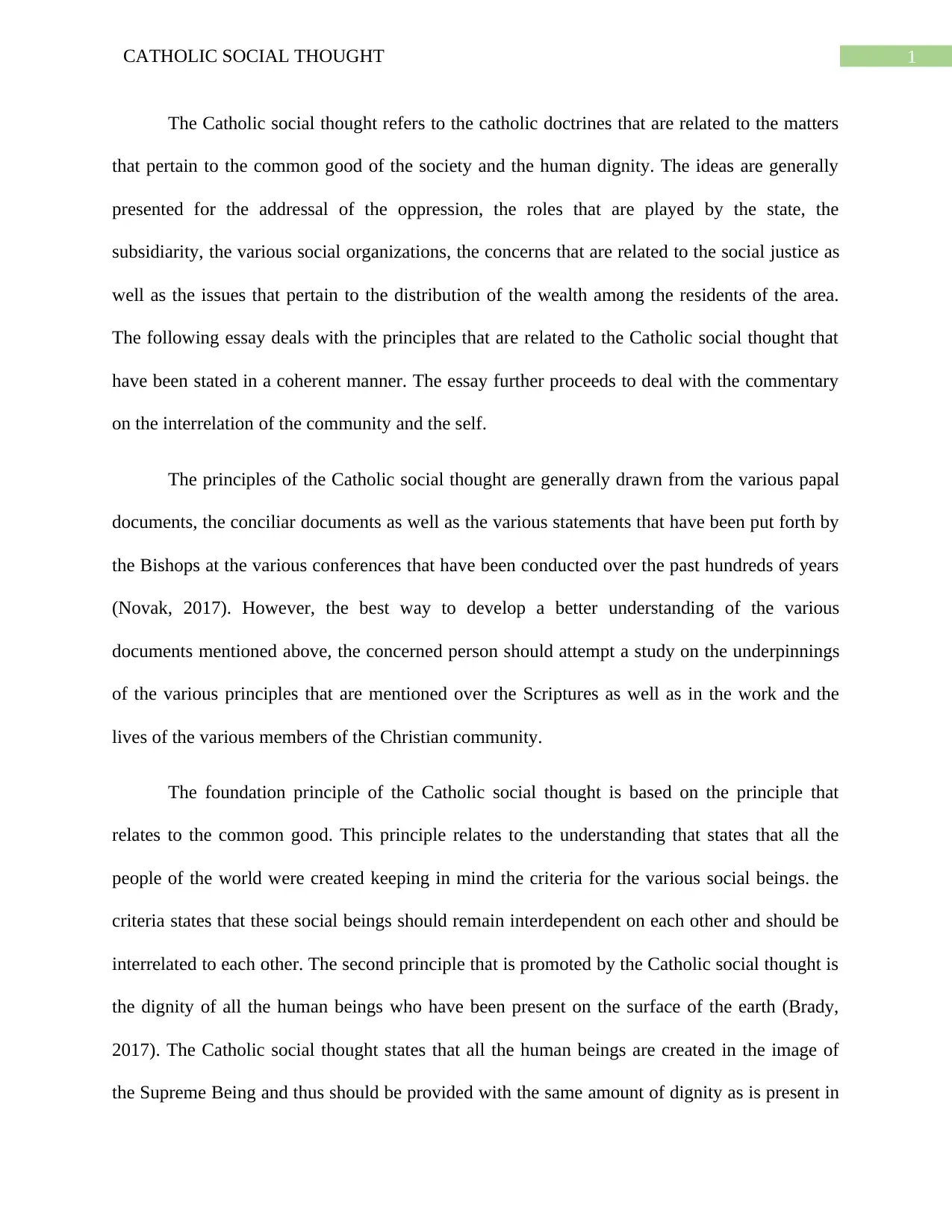
1CATHOLIC SOCIAL THOUGHT
The Catholic social thought refers to the catholic doctrines that are related to the matters
that pertain to the common good of the society and the human dignity. The ideas are generally
presented for the addressal of the oppression, the roles that are played by the state, the
subsidiarity, the various social organizations, the concerns that are related to the social justice as
well as the issues that pertain to the distribution of the wealth among the residents of the area.
The following essay deals with the principles that are related to the Catholic social thought that
have been stated in a coherent manner. The essay further proceeds to deal with the commentary
on the interrelation of the community and the self.
The principles of the Catholic social thought are generally drawn from the various papal
documents, the conciliar documents as well as the various statements that have been put forth by
the Bishops at the various conferences that have been conducted over the past hundreds of years
(Novak, 2017). However, the best way to develop a better understanding of the various
documents mentioned above, the concerned person should attempt a study on the underpinnings
of the various principles that are mentioned over the Scriptures as well as in the work and the
lives of the various members of the Christian community.
The foundation principle of the Catholic social thought is based on the principle that
relates to the common good. This principle relates to the understanding that states that all the
people of the world were created keeping in mind the criteria for the various social beings. the
criteria states that these social beings should remain interdependent on each other and should be
interrelated to each other. The second principle that is promoted by the Catholic social thought is
the dignity of all the human beings who have been present on the surface of the earth (Brady,
2017). The Catholic social thought states that all the human beings are created in the image of
the Supreme Being and thus should be provided with the same amount of dignity as is present in
The Catholic social thought refers to the catholic doctrines that are related to the matters
that pertain to the common good of the society and the human dignity. The ideas are generally
presented for the addressal of the oppression, the roles that are played by the state, the
subsidiarity, the various social organizations, the concerns that are related to the social justice as
well as the issues that pertain to the distribution of the wealth among the residents of the area.
The following essay deals with the principles that are related to the Catholic social thought that
have been stated in a coherent manner. The essay further proceeds to deal with the commentary
on the interrelation of the community and the self.
The principles of the Catholic social thought are generally drawn from the various papal
documents, the conciliar documents as well as the various statements that have been put forth by
the Bishops at the various conferences that have been conducted over the past hundreds of years
(Novak, 2017). However, the best way to develop a better understanding of the various
documents mentioned above, the concerned person should attempt a study on the underpinnings
of the various principles that are mentioned over the Scriptures as well as in the work and the
lives of the various members of the Christian community.
The foundation principle of the Catholic social thought is based on the principle that
relates to the common good. This principle relates to the understanding that states that all the
people of the world were created keeping in mind the criteria for the various social beings. the
criteria states that these social beings should remain interdependent on each other and should be
interrelated to each other. The second principle that is promoted by the Catholic social thought is
the dignity of all the human beings who have been present on the surface of the earth (Brady,
2017). The Catholic social thought states that all the human beings are created in the image of
the Supreme Being and thus should be provided with the same amount of dignity as is present in
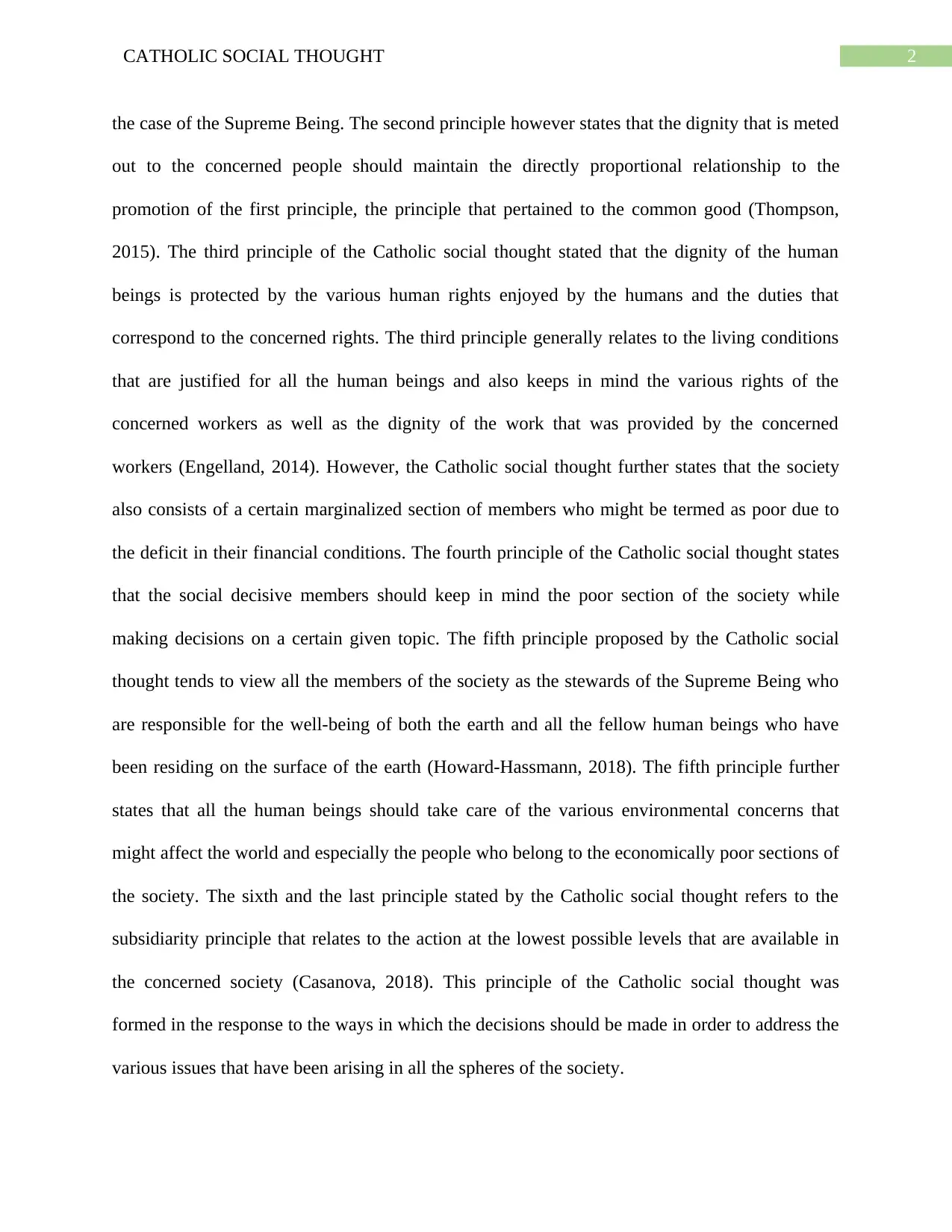
2CATHOLIC SOCIAL THOUGHT
the case of the Supreme Being. The second principle however states that the dignity that is meted
out to the concerned people should maintain the directly proportional relationship to the
promotion of the first principle, the principle that pertained to the common good (Thompson,
2015). The third principle of the Catholic social thought stated that the dignity of the human
beings is protected by the various human rights enjoyed by the humans and the duties that
correspond to the concerned rights. The third principle generally relates to the living conditions
that are justified for all the human beings and also keeps in mind the various rights of the
concerned workers as well as the dignity of the work that was provided by the concerned
workers (Engelland, 2014). However, the Catholic social thought further states that the society
also consists of a certain marginalized section of members who might be termed as poor due to
the deficit in their financial conditions. The fourth principle of the Catholic social thought states
that the social decisive members should keep in mind the poor section of the society while
making decisions on a certain given topic. The fifth principle proposed by the Catholic social
thought tends to view all the members of the society as the stewards of the Supreme Being who
are responsible for the well-being of both the earth and all the fellow human beings who have
been residing on the surface of the earth (Howard-Hassmann, 2018). The fifth principle further
states that all the human beings should take care of the various environmental concerns that
might affect the world and especially the people who belong to the economically poor sections of
the society. The sixth and the last principle stated by the Catholic social thought refers to the
subsidiarity principle that relates to the action at the lowest possible levels that are available in
the concerned society (Casanova, 2018). This principle of the Catholic social thought was
formed in the response to the ways in which the decisions should be made in order to address the
various issues that have been arising in all the spheres of the society.
the case of the Supreme Being. The second principle however states that the dignity that is meted
out to the concerned people should maintain the directly proportional relationship to the
promotion of the first principle, the principle that pertained to the common good (Thompson,
2015). The third principle of the Catholic social thought stated that the dignity of the human
beings is protected by the various human rights enjoyed by the humans and the duties that
correspond to the concerned rights. The third principle generally relates to the living conditions
that are justified for all the human beings and also keeps in mind the various rights of the
concerned workers as well as the dignity of the work that was provided by the concerned
workers (Engelland, 2014). However, the Catholic social thought further states that the society
also consists of a certain marginalized section of members who might be termed as poor due to
the deficit in their financial conditions. The fourth principle of the Catholic social thought states
that the social decisive members should keep in mind the poor section of the society while
making decisions on a certain given topic. The fifth principle proposed by the Catholic social
thought tends to view all the members of the society as the stewards of the Supreme Being who
are responsible for the well-being of both the earth and all the fellow human beings who have
been residing on the surface of the earth (Howard-Hassmann, 2018). The fifth principle further
states that all the human beings should take care of the various environmental concerns that
might affect the world and especially the people who belong to the economically poor sections of
the society. The sixth and the last principle stated by the Catholic social thought refers to the
subsidiarity principle that relates to the action at the lowest possible levels that are available in
the concerned society (Casanova, 2018). This principle of the Catholic social thought was
formed in the response to the ways in which the decisions should be made in order to address the
various issues that have been arising in all the spheres of the society.
⊘ This is a preview!⊘
Do you want full access?
Subscribe today to unlock all pages.

Trusted by 1+ million students worldwide
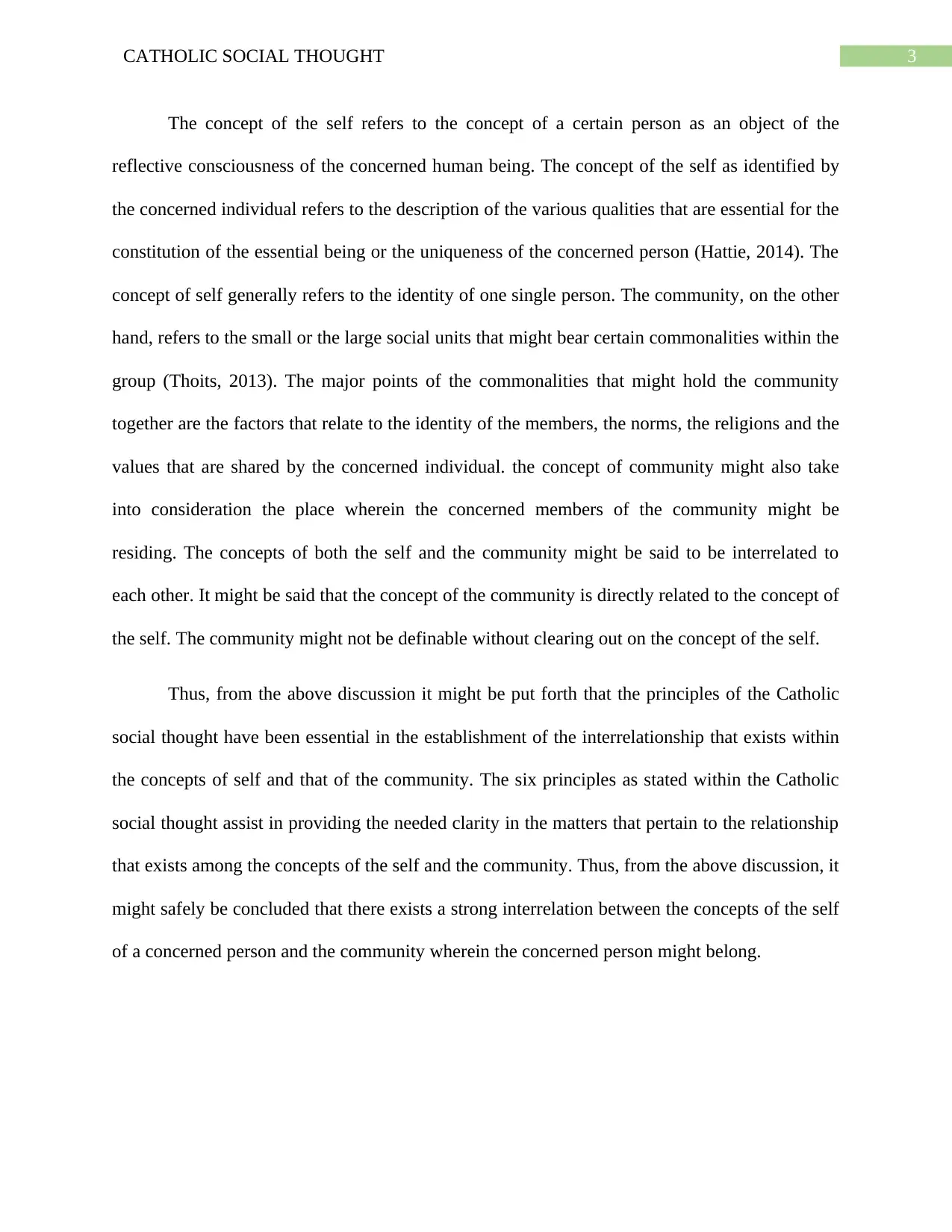
3CATHOLIC SOCIAL THOUGHT
The concept of the self refers to the concept of a certain person as an object of the
reflective consciousness of the concerned human being. The concept of the self as identified by
the concerned individual refers to the description of the various qualities that are essential for the
constitution of the essential being or the uniqueness of the concerned person (Hattie, 2014). The
concept of self generally refers to the identity of one single person. The community, on the other
hand, refers to the small or the large social units that might bear certain commonalities within the
group (Thoits, 2013). The major points of the commonalities that might hold the community
together are the factors that relate to the identity of the members, the norms, the religions and the
values that are shared by the concerned individual. the concept of community might also take
into consideration the place wherein the concerned members of the community might be
residing. The concepts of both the self and the community might be said to be interrelated to
each other. It might be said that the concept of the community is directly related to the concept of
the self. The community might not be definable without clearing out on the concept of the self.
Thus, from the above discussion it might be put forth that the principles of the Catholic
social thought have been essential in the establishment of the interrelationship that exists within
the concepts of self and that of the community. The six principles as stated within the Catholic
social thought assist in providing the needed clarity in the matters that pertain to the relationship
that exists among the concepts of the self and the community. Thus, from the above discussion, it
might safely be concluded that there exists a strong interrelation between the concepts of the self
of a concerned person and the community wherein the concerned person might belong.
The concept of the self refers to the concept of a certain person as an object of the
reflective consciousness of the concerned human being. The concept of the self as identified by
the concerned individual refers to the description of the various qualities that are essential for the
constitution of the essential being or the uniqueness of the concerned person (Hattie, 2014). The
concept of self generally refers to the identity of one single person. The community, on the other
hand, refers to the small or the large social units that might bear certain commonalities within the
group (Thoits, 2013). The major points of the commonalities that might hold the community
together are the factors that relate to the identity of the members, the norms, the religions and the
values that are shared by the concerned individual. the concept of community might also take
into consideration the place wherein the concerned members of the community might be
residing. The concepts of both the self and the community might be said to be interrelated to
each other. It might be said that the concept of the community is directly related to the concept of
the self. The community might not be definable without clearing out on the concept of the self.
Thus, from the above discussion it might be put forth that the principles of the Catholic
social thought have been essential in the establishment of the interrelationship that exists within
the concepts of self and that of the community. The six principles as stated within the Catholic
social thought assist in providing the needed clarity in the matters that pertain to the relationship
that exists among the concepts of the self and the community. Thus, from the above discussion, it
might safely be concluded that there exists a strong interrelation between the concepts of the self
of a concerned person and the community wherein the concerned person might belong.
Paraphrase This Document
Need a fresh take? Get an instant paraphrase of this document with our AI Paraphraser
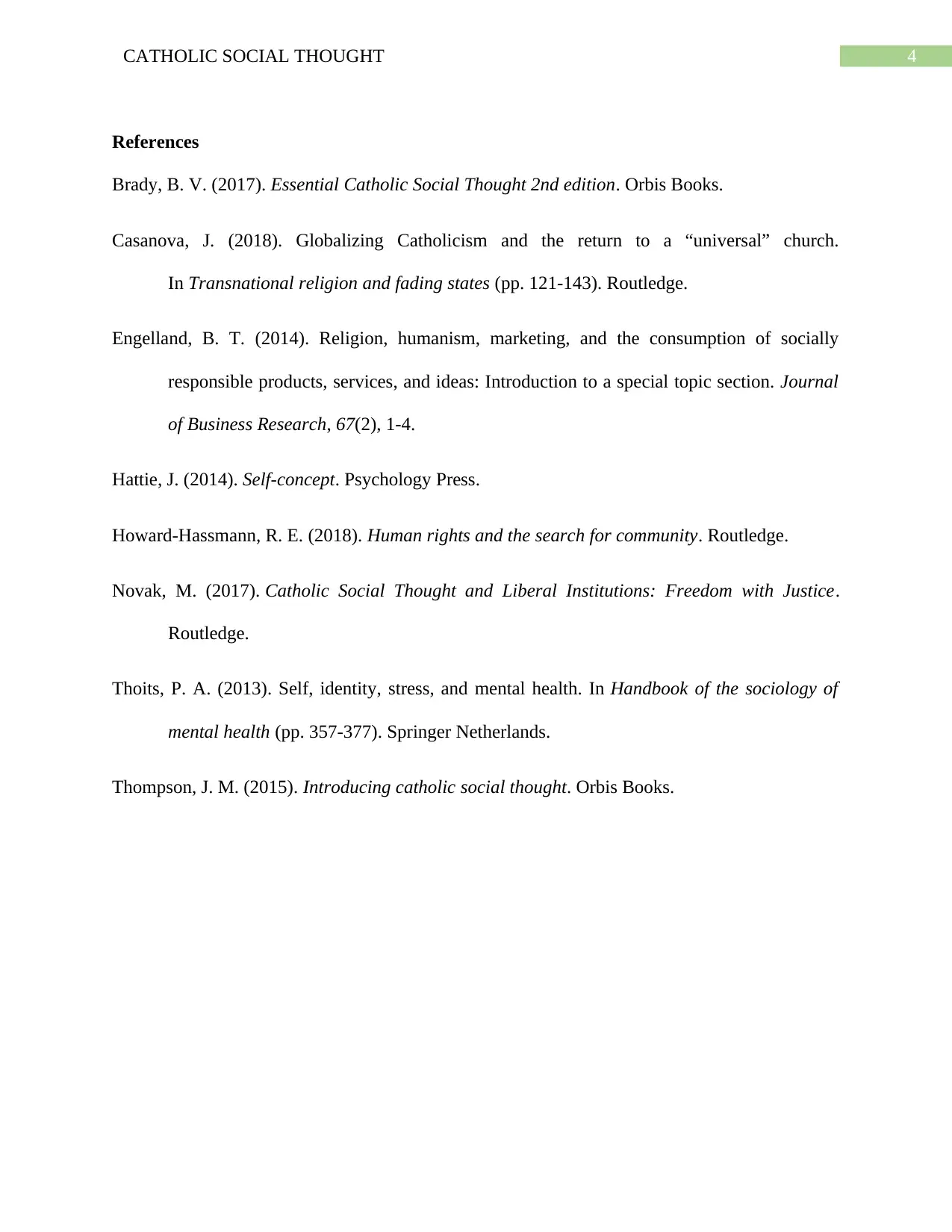
4CATHOLIC SOCIAL THOUGHT
References
Brady, B. V. (2017). Essential Catholic Social Thought 2nd edition. Orbis Books.
Casanova, J. (2018). Globalizing Catholicism and the return to a “universal” church.
In Transnational religion and fading states (pp. 121-143). Routledge.
Engelland, B. T. (2014). Religion, humanism, marketing, and the consumption of socially
responsible products, services, and ideas: Introduction to a special topic section. Journal
of Business Research, 67(2), 1-4.
Hattie, J. (2014). Self-concept. Psychology Press.
Howard-Hassmann, R. E. (2018). Human rights and the search for community. Routledge.
Novak, M. (2017). Catholic Social Thought and Liberal Institutions: Freedom with Justice.
Routledge.
Thoits, P. A. (2013). Self, identity, stress, and mental health. In Handbook of the sociology of
mental health (pp. 357-377). Springer Netherlands.
Thompson, J. M. (2015). Introducing catholic social thought. Orbis Books.
References
Brady, B. V. (2017). Essential Catholic Social Thought 2nd edition. Orbis Books.
Casanova, J. (2018). Globalizing Catholicism and the return to a “universal” church.
In Transnational religion and fading states (pp. 121-143). Routledge.
Engelland, B. T. (2014). Religion, humanism, marketing, and the consumption of socially
responsible products, services, and ideas: Introduction to a special topic section. Journal
of Business Research, 67(2), 1-4.
Hattie, J. (2014). Self-concept. Psychology Press.
Howard-Hassmann, R. E. (2018). Human rights and the search for community. Routledge.
Novak, M. (2017). Catholic Social Thought and Liberal Institutions: Freedom with Justice.
Routledge.
Thoits, P. A. (2013). Self, identity, stress, and mental health. In Handbook of the sociology of
mental health (pp. 357-377). Springer Netherlands.
Thompson, J. M. (2015). Introducing catholic social thought. Orbis Books.
1 out of 5
Related Documents
Your All-in-One AI-Powered Toolkit for Academic Success.
+13062052269
info@desklib.com
Available 24*7 on WhatsApp / Email
![[object Object]](/_next/static/media/star-bottom.7253800d.svg)
Unlock your academic potential
Copyright © 2020–2026 A2Z Services. All Rights Reserved. Developed and managed by ZUCOL.


